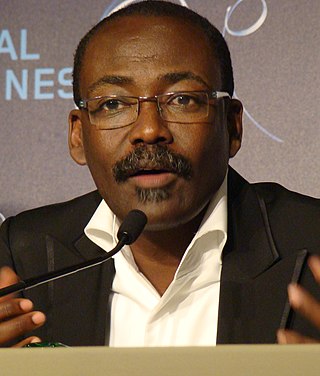Related Research Articles

Niger pursues a moderate foreign policy and maintains friendly relations with both East and West. It is a member state of the United Nations. Niger maintains a special relationship with France and enjoys close relations with its West African neighbours.

Bamako is the capital and largest city of Mali, with a 2022 population of 4,227,569. It is located on the Niger River, near the rapids that divide the upper and middle Niger valleys in the southwestern part of the country.

Jean Rouch was a French filmmaker and anthropologist.

Michel Serrault was a French stage and film actor who appeared from 1954 until 2007 in more than 130 films.

Brothers Jean-Pierre Dardenne and Luc Dardenne, collectively referred to as the Dardenne brothers, are a Belgian filmmaking duo. They write, produce, and direct their films together. They also own the production company Les Films du Fleuve.
Bachir Bensaddek is a Canadian television director of Algerian Berber descent, best known for his co-direction of 2002 Emmy Award-winning TV series Cirque du Soleil: Fire Within.

Cinema of Chad is small but growing. The first film made in the country was the 1958 John Huston adventure film The Roots of Heaven, filmed when the country was still a part of French Equatorial Africa. Documentary filmmaker Edouard Sailly made a series of shorts in the 1960s depicting daily life in the country. During this period there were a number of cinemas in the country, including Le Normandie, Le Vogue, the Rio, the Étoile and the Shéherazade in N'Djamena, the Rex in Sarh, the Logone in Moundou and the Ciné Chachati in Abéché. The film industry suffered severely in the 1970s-80s as Chad became engulfed in a series of civil wars and foreign military interventions; film production stopped, and all the cinemas in Chad closed down. Following the ousting of dictator Hissène Habré by Idriss Déby in 1990 the situation in the country stabilised somewhat, allowing the development of a nascent film industry, most notably through the work of directors Mahamat-Saleh Haroun, Issa Serge Coelo and Abakar Chene Massar. Mahamat-Saleh Haroun has won awards at the Panafrican Film and Television Festival of Ouagadougou, Venice International Film Festival and the Cannes Film Festival. In January 2011 Le Normandie in N'Djamena, said now to be the only cinema in Chad, re-opened with government support.
The Cinema of Niger began in the 1940s with the ethnographical documentary of French director Jean Rouch, before growing to become one of the most active national film cultures in Francophone Africa in the 1960s-70s with the work of filmmakers such as Oumarou Ganda, Moustapha Alassane and Gatta Abdourahamne. The industry has slowed somewhat since the 1980s, though films continue to be made in the country, with notable directors of recent decades including Mahamane Bakabe, Inoussa Ousseini, Mariama Hima, Moustapha Diop and Rahmatou Keïta. Unlike neighbouring Nigeria, with its thriving Hausa and English-language film industries, most Nigerien films are made in French with Francophone countries as their major market, whilst action and light entertainment films from Nigeria or dubbed western films fill most Nigerien theatres.
The Grand prix littéraire d'Afrique noire is a literary prize presented every year by the ADELF, the Association of French Language Writers for a French original text from Sub-Saharan Africa. It was originally endowed with 2,000 french francs.
Damouré Zika was a Nigerien traditional healer, broadcaster, and film actor. Coming from a long line of traditional healers in the Sorko ethnic group of western Niger, Zika appeared in many of the films of French director Jean Rouch, becoming one of Niger's first actors. As a practitioner of traditional medicine, he opened a clinic in Niamey, and was for many years a broadcaster and commentator on health issues for Niger's national radio.
Mariama Hima Yankori is a Nigerien film director, ethnologist and politician. She became the first female Nigerien film director in the 1980s, was State Secretary of Promotion of Women and Protection of Children, and later the first female Nigerien ambassador to France.

Taïeb Louhichi was a Tunisian film director, screenwriter, producer and filmmaker. His best known works include his debut feature film, Shadow of the Earth (1982), Layla, My Reason (1989), and La Danse Du Vent (2004).
Katy Léna N'diaye is a Senegalese journalist and documentary filmmaker, best known for her documentaries about women muralists in Africa.
Zalika Souley was a Nigerien actress, the first sub-Saharan movie actress, and one of the pioneering actresses of African cinema.

Olivier Barlet is a French journalist, translator, film critic and researcher on African cinema and its diasporas.
Ecrans Noirs Festival is a film festival in Yaoundé, Cameroon. It has been characterized as "Central Africa's largest cinema event".
Joël M'Maka Tchédré, is a Togolese director, producer, screenwriter. He is best known for the films such as Pacte and T’Bool. He is also an executive producer, and festival director.
Fatima Regragui was a Moroccan actress.
Le Pagne is a 2015 Nigerien film directed by Moussa Hamadou Djingarey. It was screened at the Ecrans Noirs Festival in Yaoundé.

The Festival cinémas d’Afrique Lausanne is an international yearly film festival held in August at Lausanne, Switzerland, since 2006 screening new films about or originating from Africa.
References
- ↑ IMDb - Niger, 5 November 2019
- ↑ IMDb - Filming Location: Niger, 6 November 2019
- ↑ Les cinémas d'Afrique: dictionnaire (in French). Karthala Editions. 2000. p. 236. ISBN 2845860609.
- ↑ Moutari, Souley (13 May 2014). "Portraits des femmes pionnières du Niger" (in French). Nigerdiaspora. Archived from the original on 2 February 2016. Retrieved 28 January 2016.
- ↑ "Le Fleuve Niger se meurt". Comité du Film Ethnographique - Festival Jean Rouch (in French). Retrieved 2024-11-22.
- ↑ admin-ccaf (2007-04-01). "Le fleuve Niger se meurt - Association Cinémas et Cultures d'Afrique". cinemasdafrique.asso.fr/ (in French). Retrieved 2024-11-22.